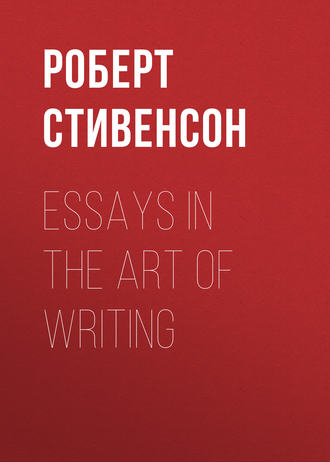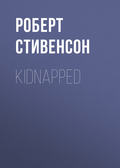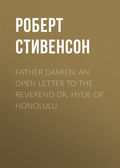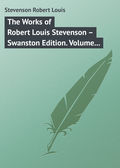
Роберт Льюис Стивенсон
Essays in the Art of Writing
MY FIRST BOOK: ‘TREASURE ISLAND’ 16
It was far indeed from being my first book, for I am not a novelist alone. But I am well aware that my paymaster, the Great Public, regards what else I have written with indifference, if not aversion; if it call upon me at all, it calls on me in the familiar and indelible character; and when I am asked to talk of my first book, no question in the world but what is meant is my first novel.
Sooner or later, somehow, anyhow, I was bound to write a novel. It seems vain to ask why. Men are born with various manias: from my earliest childhood, it was mine to make a plaything of imaginary series of events; and as soon as I was able to write, I became a good friend to the paper-makers. Reams upon reams must have gone to the making of ‘Rathillet,’ ‘The Pentland Rising,’ 17 ‘The King’s Pardon’ (otherwise ‘Park Whitehead’), ‘Edward Daven,’ ‘A Country Dance,’ and ‘A Vendetta in the West’; and it is consolatory to remember that these reams are now all ashes, and have been received again into the soil. I have named but a few of my ill-fated efforts, only such indeed as came to a fair bulk ere they were desisted from; and even so they cover a long vista of years. ‘Rathillet’ was attempted before fifteen, ‘The Vendetta’ at twenty-nine, and the succession of defeats lasted unbroken till I was thirty-one. By that time, I had written little books and little essays and short stories; and had got patted on the back and paid for them – though not enough to live upon. I had quite a reputation, I was the successful man; I passed my days in toil, the futility of which would sometimes make my cheek to burn – that I should spend a man’s energy upon this business, and yet could not earn a livelihood: and still there shone ahead of me an unattained ideal: although I had attempted the thing with vigour not less than ten or twelve times, I had not yet written a novel. All – all my pretty ones – had gone for a little, and then stopped inexorably like a schoolboy’s watch. I might be compared to a cricketer of many years’ standing who should never have made a run. Anybody can write a short story – a bad one, I mean – who has industry and paper and time enough; but not every one may hope to write even a bad novel. It is the length that kills.
The accepted novelist may take his novel up and put it down, spend days upon it in vain, and write not any more than he makes haste to blot. Not so the beginner. Human nature has certain rights; instinct – the instinct of self-preservation – forbids that any man (cheered and supported by the consciousness of no previous victory) should endure the miseries of unsuccessful literary toil beyond a period to be measured in weeks. There must be something for hope to feed upon. The beginner must have a slant of wind, a lucky vein must be running, he must be in one of those hours when the words come and the phrases balance of themselves —even to begin. And having begun, what a dread looking forward is that until the book shall be accomplished! For so long a time, the slant is to continue unchanged, the vein to keep running, for so long a time you must keep at command the same quality of style: for so long a time your puppets are to be always vital, always consistent, always vigorous! I remember I used to look, in those days, upon every three-volume novel with a sort of veneration, as a feat – not possibly of literature – but at least of physical and moral endurance and the courage of Ajax.
In the fated year I came to live with my father and mother at Kinnaird, above Pitlochry. Then I walked on the red moors and by the side of the golden burn; the rude, pure air of our mountains inspirited, if it did not inspire us, and my wife and I projected a joint volume of logic stories, for which she wrote ‘The Shadow on the Bed,’ and I turned out ‘Thrawn Janet,’ and a first draft of ‘The Merry Men.’ I love my native air, but it does not love me; and the end of this delightful period was a cold, a fly-blister, and a migration by Strathairdle and Glenshee to the Castleton of Braemar.
There it blew a good deal and rained in a proportion; my native air was more unkind than man’s ingratitude, and I must consent to pass a good deal of my time between four walls in a house lugubriously known as the Late Miss McGregor’s Cottage. And now admire the finger of predestination. There was a schoolboy in the Late Miss McGregor’s Cottage, home from the holidays, and much in want of ‘something craggy to break his mind upon.’ He had no thought of literature; it was the art of Raphael that received his fleeting suffrages; and with the aid of pen and ink and a shilling box of water colours, he had soon turned one of the rooms into a picture gallery. My more immediate duty towards the gallery was to be showman; but I would sometimes unbend a little, join the artist (so to speak) at the easel, and pass the afternoon with him in a generous emulation, making coloured drawings. On one of these occasions, I made the map of an island; it was elaborately and (I thought) beautifully coloured; the shape of it took my fancy beyond expression; it contained harbours that pleased me like sonnets; and with the unconsciousness of the predestined, I ticketed my performance ‘Treasure Island.’ I am told there are people who do not care for maps, and find it hard to believe. The names, the shapes of the woodlands, the courses of the roads and rivers, the prehistoric footsteps of man still distinctly traceable up hill and down dale, the mills and the ruins, the ponds and the ferries, perhaps the Standing Stone or the Druidic Circle on the heath; here is an inexhaustible fund of interest for any man with eyes to see or twopence-worth of imagination to understand with! No child but must remember laying his head in the grass, staring into the infinitesimal forest and seeing it grow populous with fairy armies.
Somewhat in this way, as I paused upon my map of ‘Treasure Island,’ the future character of the book began to appear there visibly among imaginary woods; and their brown faces and bright weapons peeped out upon me from unexpected quarters, as they passed to and fro, fighting and hunting treasure, on these few square inches of a flat projection. The next thing I knew I had some papers before me and was writing out a list of chapters. How often have I done so, and the thing gone no further! But there seemed elements of success about this enterprise. It was to be a story for boys; no need of psychology or fine writing; and I had a boy at hand to be a touchstone. Women were excluded. I was unable to handle a brig (which the Hispaniola should have been), but I thought I could make shift to sail her as a schooner without public shame. And then I had an idea for John Silver from which I promised myself funds of entertainment; to take an admired friend of mine (whom the reader very likely knows and admires as much as I do), to deprive him of all his finer qualities and higher graces of temperament, to leave him with nothing but his strength, his courage, his quickness, and his magnificent geniality, and to try to express these in terms of the culture of a raw tarpaulin. Such psychical surgery is, I think, a common way of ‘making character’; perhaps it is, indeed, the only way. We can put in the quaint figure that spoke a hundred words with us yesterday by the wayside; but do we know him? Our friend, with his infinite variety and flexibility, we know – but can we put him in? Upon the first, we must engraft secondary and imaginary qualities, possibly all wrong; from the second, knife in hand, we must cut away and deduct the needless arborescence of his nature, but the trunk and the few branches that remain we may at least be fairly sure of.
On a chill September morning, by the cheek of a brisk fire, and the rain drumming on the window, I began The Sea Cook, for that was the original title. I have begun (and finished) a number of other books, but I cannot remember to have sat down to one of them with more complacency. It is not to be wondered at, for stolen waters are proverbially sweet. I am now upon a painful chapter. No doubt the parrot once belonged to Robinson Crusoe. No doubt the skeleton is conveyed from Poe. I think little of these, they are trifles and details; and no man can hope to have a monopoly of skeletons or make a corner in talking birds. The stockade, I am told, is from Masterman Ready. It may be, I care not a jot. These useful writers had fulfilled the poet’s saying: departing, they had left behind them Footprints on the sands of time, Footprints which perhaps another – and I was the other! It is my debt to Washington Irving that exercises my conscience, and justly so, for I believe plagiarism was rarely carried farther. I chanced to pick up the Tales of a Traveller some years ago with a view to an anthology of prose narrative, and the book flew up and struck me: Billy Bones, his chest, the company in the parlour, the whole inner spirit, and a good deal of the material detail of my first chapters – all were there, all were the property of Washington Irving. But I had no guess of it then as I sat writing by the fireside, in what seemed the spring-tides of a somewhat pedestrian inspiration; nor yet day by day, after lunch, as I read aloud my morning’s work to the family. It seemed to me original as sin; it seemed to belong to me like my right eye. I had counted on one boy, I found I had two in my audience. My father caught fire at once with all the romance and childishness of his original nature. His own stories, that every night of his life he put himself to sleep with, dealt perpetually with ships, roadside inns, robbers, old sailors, and commercial travellers before the era of steam. He never finished one of these romances; the lucky man did not require to! But in Treasure Island he recognised something kindred to his own imagination; it was his kind of picturesque; and he not only heard with delight the daily chapter, but set himself acting to collaborate. When the time came for Billy Bones’s chest to be ransacked, he must have passed the better part of a day preparing, on the back of a legal envelope, an inventory of its contents, which I exactly followed; and the name of ‘Flint’s old ship’ – the Walrus– was given at his particular request. And now who should come dropping in, ex machinâ, but Dr. Japp, like the disguised prince who is to bring down the curtain upon peace and happiness in the last act; for he carried in his pocket, not a horn or a talisman, but a publisher – had, in fact, been charged by my old friend, Mr. Henderson, to unearth new writers for Young Folks. Even the ruthlessness of a united family recoiled before the extreme measure of inflicting on our guest the mutilated members of The Sea Cook; at the same time, we would by no means stop our readings; and accordingly the tale was begun again at the beginning, and solemnly re-delivered for the benefit of Dr. Japp. From that moment on, I have thought highly of his critical faculty; for when he left us, he carried away the manuscript in his portmanteau.
Here, then, was everything to keep me up, sympathy, help, and now a positive engagement. I had chosen besides a very easy style. Compare it with the almost contemporary ‘Merry Men’, one reader may prefer the one style, one the other – ’tis an affair of character, perhaps of mood; but no expert can fail to see that the one is much more difficult, and the other much easier to maintain. It seems as though a full-grown experienced man of letters might engage to turn out Treasure Island at so many pages a day, and keep his pipe alight. But alas! this was not my case. Fifteen days I stuck to it, and turned out fifteen chapters; and then, in the early paragraphs of the sixteenth, ignominiously lost hold. My mouth was empty; there was not one word of Treasure Island in my bosom; and here were the proofs of the beginning already waiting me at the ‘Hand and Spear’! Then I corrected them, living for the most part alone, walking on the heath at Weybridge in dewy autumn mornings, a good deal pleased with what I had done, and more appalled than I can depict to you in words at what remained for me to do. I was thirty-one; I was the head of a family; I had lost my health; I had never yet paid my way, never yet made £200 a year; my father had quite recently bought back and cancelled a book that was judged a failure: was this to be another and last fiasco? I was indeed very close on despair; but I shut my mouth hard, and during the journey to Davos, where I was to pass the winter, had the resolution to think of other things and bury myself in the novels of M. de Boisgobey. Arrived at my destination, down I sat one morning to the unfinished tale; and behold! it flowed from me like small talk; and in a second tide of delighted industry, and again at a rate of a chapter a day, I finished Treasure Island. It had to be transcribed almost exactly; my wife was ill; the schoolboy remained alone of the faithful; and John Addington Symonds (to whom I timidly mentioned what I was engaged on) looked on me askance. He was at that time very eager I should write on the characters of Theophrastus: so far out may be the judgments of the wisest men. But Symonds (to be sure) was scarce the confidant to go to for sympathy on a boy’s story. He was large-minded; ‘a full man,’ if there was one; but the very name of my enterprise would suggest to him only capitulations of sincerity and solecisms of style. Well! he was not far wrong.
Treasure Island– it was Mr. Henderson who deleted the first title, The Sea Cook– appeared duly in the story paper, where it figured in the ignoble midst, without woodcuts, and attracted not the least attention. I did not care. I liked the tale myself, for much the same reason as my father liked the beginning: it was my kind of picturesque. I was not a little proud of John Silver, also; and to this day rather admire that smooth and formidable adventurer. What was infinitely more exhilarating, I had passed a landmark; I had finished a tale, and written ‘The End’ upon my manuscript, as I had not done since ‘The Pentland Rising,’ when I was a boy of sixteen not yet at college. In truth it was so by a set of lucky accidents; had not Dr. Japp come on his visit, had not the tale flowed from me with singular case, it must have been laid aside like its predecessors, and found a circuitous and unlamented way to the fire. Purists may suggest it would have been better so. I am not of that mind. The tale seems to have given much pleasure, and it brought (or, was the means of bringing) fire and food and wine to a deserving family in which I took an interest. I need scarcely say I mean my own.
But the adventures of Treasure Island are not yet quite at an end. I had written it up to the map. The map was the chief part of my plot. For instance, I had called an islet ‘Skeleton Island,’ not knowing what I meant, seeking only for the immediate picturesque, and it was to justify this name that I broke into the gallery of Mr. Poe and stole Flint’s pointer. And in the same way, it was because I had made two harbours that the Hispaniola was sent on her wanderings with Israel Hands. The time came when it was decided to republish, and I sent in my manuscript, and the map along with it, to Messrs. Cassell. The proofs came, they were corrected, but I heard nothing of the map. I wrote and asked; was told it had never been received, and sat aghast. It is one thing to draw a map at random, set a scale in one corner of it at a venture, and write up a story to the measurements. It is quite another to have to examine a whole book, make an inventory of all the allusions contained in it, and with a pair of compasses, painfully design a map to suit the data. I did it; and the map was drawn again in my father’s office, with embellishments of blowing whales and sailing ships, and my father himself brought into service a knack he had of various writing, and elaborately forged the signature of Captain Flint, and the sailing directions of Billy Bones. But somehow it was never Treasure Island to me.
I have said the map was the most of the plot. I might almost say it was the whole. A few reminiscences of Poe, Defoe, and Washington Irving, a copy of Johnson’s Buccaneers, the name of the Dead Man’s Chest from Kingsley’s At Last, some recollections of canoeing on the high seas, and the map itself, with its infinite, eloquent suggestion, made up the whole of my materials. It is, perhaps, not often that a map figures so largely in a tale, yet it is always important. The author must know his countryside, whether real or imaginary, like his hand; the distances, the points of the compass, the place of the sun’s rising, the behaviour of the moon, should all be beyond cavil. And how troublesome the moon is! I have come to grief over the moon in Prince Otto, and so soon as that was pointed out to me, adopted a precaution which I recommend to other men – I never write now without an almanack. With an almanack, and the map of the country, and the plan of every house, either actually plotted on paper or already and immediately apprehended in the mind, a man may hope to avoid some of the grossest possible blunders. With the map before him, he will scarce allow the sun to set in the east, as it does in The Antiquary. With the almanack at hand, he will scarce allow two horsemen, journeying on the most urgent affair, to employ six days, from three of the Monday morning till late in the Saturday night, upon a journey of, say, ninety or a hundred miles, and before the week is out, and still on the same nags, to cover fifty in one day, as may be read at length in the inimitable novel of Rob Roy. And it is certainly well, though far from necessary, to avoid such ‘croppers.’ But it is my contention – my superstition, if you like – that who is faithful to his map, and consults it, and draws from it his inspiration, daily and hourly, gains positive support, and not mere negative immunity from accident. The tale has a root there; it grows in that soil; it has a spine of its own behind the words. Better if the country be real, and he has walked every foot of it and knows every milestone. But even with imaginary places, he will do well in the beginning to provide a map; as he studies it, relations will appear that he had not thought upon; he will discover obvious, though unsuspected, short-cuts and footprints for his messengers; and even when a map is not all the plot, as it was in Treasure Island, it will be found to be a mine of suggestion.






